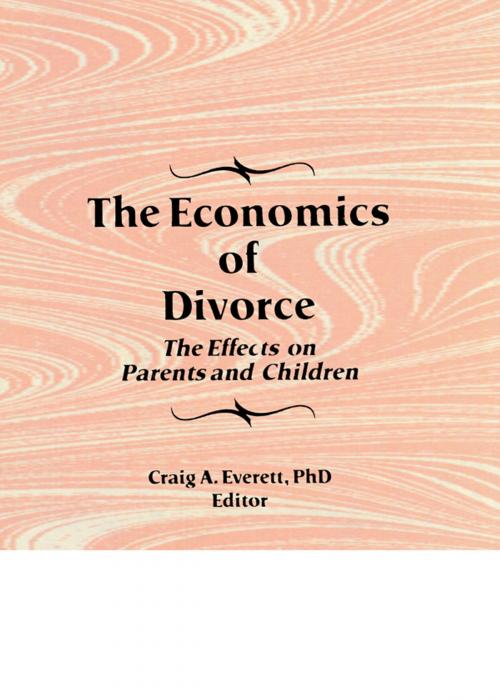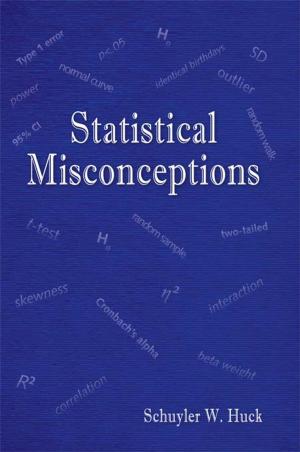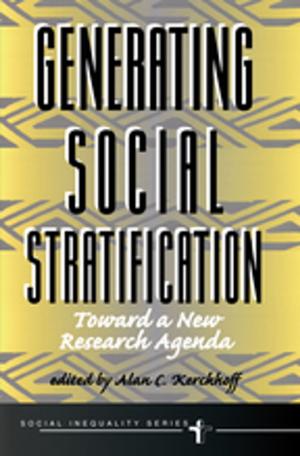The Economics of Divorce
The Effects on Parents and Children
Nonfiction, Family & Relationships, Family Relationships, Divorce, Health & Well Being, Psychology, Mental Health| Author: | Craig Everett | ISBN: | 9781317764564 |
| Publisher: | Taylor and Francis | Publication: | January 9, 2014 |
| Imprint: | Routledge | Language: | English |
| Author: | Craig Everett |
| ISBN: | 9781317764564 |
| Publisher: | Taylor and Francis |
| Publication: | January 9, 2014 |
| Imprint: | Routledge |
| Language: | English |
The Economics of Divorce recognizes the critical role economic factors play during and after the divorce process. In the past, research into this issue has remained very general despite the enormous weight economics put on the entire divorce process. This book concentrates on elements specifically relevant to the economic variables of divorce. It focuses on the issues of work, employment, and financial support after divorce and how these issues affect the parents, children, and home environments of divorced families. The research presented not only provides insights into the economic aspects of divorce, but it is also invaluable to the entire study of divorce and remarriage as it explores the personal impact of these issues.
Geared toward anyone working with divorced families, whether they are clinicians, educators, mediators, or attorneys, The Economics of Divorce is also of use to members of divorced or remarried families. The book contains demographics on the financial lives of custodial parents who remarry, custodial parents who work, and the financial support of college students from divorced families. It offers a close study of the realities of single parenting and reentering the work force, as well as the economic consequences of marital dissolution.
The Economics of Divorce is unique in that it is the first publication of its kind to formally identify the economic results of divorcing and remarried families. It reshapes thinking on issues often taken for granted and redefines the ways in which financial issues are addressed.
This book analyzes and advises readers on a number of personal and practical issues. Topics discussed include:
-
the role of employment for women
-
intergenerational financial support
-
the economics of remarried families
-
financial support for children’s college education
The book was designed not only to address these issues but to also facilitate further research and discussion into the economic realities of divorced families. The Economics of Divorce is the first in its field to address the impact of economics on divorced families, but hopefully not the last.
The Economics of Divorce recognizes the critical role economic factors play during and after the divorce process. In the past, research into this issue has remained very general despite the enormous weight economics put on the entire divorce process. This book concentrates on elements specifically relevant to the economic variables of divorce. It focuses on the issues of work, employment, and financial support after divorce and how these issues affect the parents, children, and home environments of divorced families. The research presented not only provides insights into the economic aspects of divorce, but it is also invaluable to the entire study of divorce and remarriage as it explores the personal impact of these issues.
Geared toward anyone working with divorced families, whether they are clinicians, educators, mediators, or attorneys, The Economics of Divorce is also of use to members of divorced or remarried families. The book contains demographics on the financial lives of custodial parents who remarry, custodial parents who work, and the financial support of college students from divorced families. It offers a close study of the realities of single parenting and reentering the work force, as well as the economic consequences of marital dissolution.
The Economics of Divorce is unique in that it is the first publication of its kind to formally identify the economic results of divorcing and remarried families. It reshapes thinking on issues often taken for granted and redefines the ways in which financial issues are addressed.
This book analyzes and advises readers on a number of personal and practical issues. Topics discussed include:
-
the role of employment for women
-
intergenerational financial support
-
the economics of remarried families
-
financial support for children’s college education
The book was designed not only to address these issues but to also facilitate further research and discussion into the economic realities of divorced families. The Economics of Divorce is the first in its field to address the impact of economics on divorced families, but hopefully not the last.















